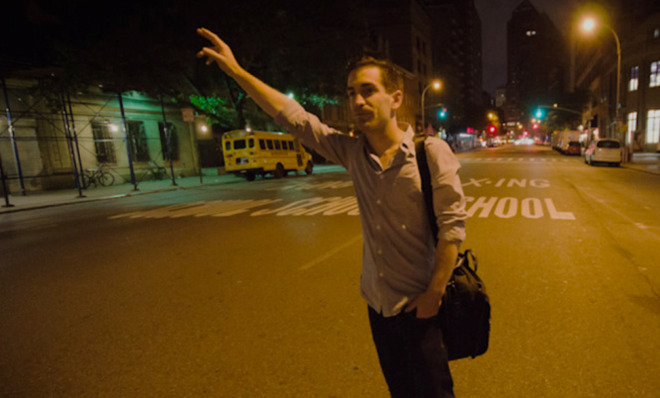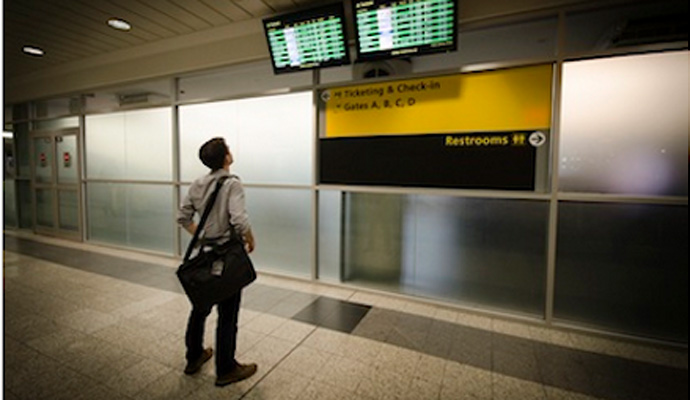Meet Manhattan's most ambitious reverse-commuter
This man commutes 450 miles to his office

A free daily email with the biggest news stories of the day – and the best features from TheWeek.com
You are now subscribed
Your newsletter sign-up was successful

On a recent Saturday night out at The Rusty Knot, a nautical-themed bar facing the West Side Highway, Jonathan Weiss looks like a typical 26-year-old New Yorker. Chatting with friends in the packed bar, he sips a Tecate underneath a ceiling decorated with a fisherman's net, seashells, and oars.
Jonathan lives across town in an immaculate East Village studio, the ideal bachelor pad in a lively neighborhood flush with twenty-somethings. He is slim but toned (he recently completed a Tough Mudder obstacle-course race) with a strong jaw line and close-cropped brown hair. A few months ago, Jonathan started dating Meagan Murphy, a striking blue-eyed brunette from Connecticut whom he got to know at another bar, following a Zogsports kickball league game. "We played beer pong and I crushed you," Jonathan jokes of their first activity together.
Meagan is studying at Columbia University's graduate School of Nursing to become a nurse practitioner. She's also currently working as a nurse. Jonathan, meanwhile, works in real estate development, sometimes overseeing multiple projects worth tens of millions of dollars. He adores his job.
The Week
Escape your echo chamber. Get the facts behind the news, plus analysis from multiple perspectives.

Sign up for The Week's Free Newsletters
From our morning news briefing to a weekly Good News Newsletter, get the best of The Week delivered directly to your inbox.
From our morning news briefing to a weekly Good News Newsletter, get the best of The Week delivered directly to your inbox.
The only problem is that Jonathan's office is in Cleveland, more than 450 miles away from his home on Fourth Avenue. The result is a weekly commute that puts Metro-North jockeys, with their cushy monthly rail passes, to shame.
(More from Narratively: Acquiring anonymity in America)
E.B. White, in his 1948 essay "Here is New York," described a traditional commuter as "the queerest bird of all":
The suburb he inhabits has no essential vitality of its own and is a mere roost where he comes at day's end to go to sleep. Except in rare cases, the man who lives in Mamaroneck or Little Neck or Teaneck, and works in New York, discovers nothing much about the city except the time of arrival and departure of trains and buses, and the path to a quick lunch…He has fished in Manhattan's wallet and dug out coins, but has never listened to Manhattan's breathing, never awakened to its morning, never dropped off to sleep in its night.
According to a 2010 report by the Department of City Planning, roughly 540,000 people commute daily into Manhattan from outside the city, joining more than 880,000 from other boroughs.
A free daily email with the biggest news stories of the day – and the best features from TheWeek.com
But nowadays there are other commuters, like Jonathan, who do the opposite. They reside in New York and travel for work, adopting a disjointed lifestyle in exchange for the benefits of our vibrant city.

"My whole family's in Chicago," Jonathan says before leaving his apartment on that recent Saturday night out. "But I wanted to try something different."
"I love it. I see something new every day. Today I saw a guy with a cat on his head!" he exclaims, possibly referring to a well-known panhandler and his tuxedo cat who sometimes frequent the Upper West Side. "I didn't want to look back at my twenties and say I didn't experience enough."
New York's reverse commuters, particularly those like Jonathan, are probably more closely related to another of the apt descriptions from White's essay — "The person who was born somewhere else and came to New York in quest of something":
"Each embraces New York with the intense excitement of first love, each absorbs New York with the fresh eyes of an adventurer, each generates heat and light to dwarf the Consolidated Edison Company."
But such a life is not easy, as Jonathan's draining weekly routine demonstrates.
(More from Narratively: The quest for an American visa)
It is farmer-early on an October Monday, and Jonathan is standing in the middle of Fourth Avenue trying to hail a cab. The sun has yet to graze the horizon, and a couple blocks downtown Astor Place is uncharacteristically quiet, as if the neighborhood is sleeping off the weekend.
"It's funny, 'cause the doorman doesn't even ask questions anymore," Jonathan remarks. "He used to say, 'Where are you going? Why are you up so early?'"
This Monday is no different than most. Jonathan walks out into the Manhattan darkness at 4:30 a.m. and hops a cab to LaGuardia Airport. His flight leaves at 6, and at 8 he's expected at his desk in Cleveland.

Jonathan is such a regular on the 6 a.m. United flight that he requests the same seat, 3A, every time.
"It's the same flight every week, so you see the same people," he says. "It's like when you're in class and the seats aren't assigned, but everyone sits in the same seat every week."
Jonathan stays at his parents' house in Cleveland Monday through Thursday, then he leaves for New York, usually around three or four p.m., working in the airport, on the plane and, finally, in his East Village apartment.
Amazingly, Jonathan is not the only Weiss to endure a grueling commute to Cleveland. His 28-year-old brother Michael also travels in the wee hours on Monday mornings, but he starts from his home in Chicago.
Both brothers work for Richland Communities, a real estate development company that was co-founded by their father, Irving.
"There's a very intense familial bond, and that's part of the reason we didn't go and find jobs elsewhere," Jonathan explains. "We always dreamed of coming back to work at the company he created, so that's what makes it worth the sacrifice."
But the Weiss brothers' devotion to their family goes well beyond their career choices. In fact, their father is one of the most critical factors in their restless lifestyles.
(More from Narratively: Emigration gone wrong)
Jonathan affectionately describes Irving as "Israeli-born, and he's very macho but a huge softy for his kids."
"He was a workaholic, so every Saturday we'd go to construction sites," Jonathan remembers. "We would drive tractors and backhoes, that's every little boy's dream. We'd play in mud, and my mom would say we'd had fun if it was filthy."
Sixteen years ago, when Jonathan was 10 and Michael was 12, Irving, an avid cyclist who pedaled more than 1,000 miles a month, suffered a catastrophic brain injury after he was hit by a car.
"He was in a coma for six months, and in a hospital for about a year or a year and a half," Jonathan says.
Irving was left a quadriplegic and unable to work, and "he needs 24-hour care," Jonathan explains. "So when we're commuting in Cleveland we can help take care of him."
The brothers routinely help their mother, Hedy, feed, dress and bathe Irving. Their aid is invaluable since most of the extended Weiss clan lives in Chicago.
Read the rest of this story at Narratively.
Narratively is an online magazine devoted to original, in-depth and untold stories. Each week, Narratively explores a different theme and publishes just one story a day. It was one of TIME's 50 Best Websites of 2013.
-
 Bad Bunny’s Super Bowl: A win for unity
Bad Bunny’s Super Bowl: A win for unityFeature The global superstar's halftime show was a celebration for everyone to enjoy
-
 Book reviews: ‘Bonfire of the Murdochs’ and ‘The Typewriter and the Guillotine’
Book reviews: ‘Bonfire of the Murdochs’ and ‘The Typewriter and the Guillotine’Feature New insights into the Murdoch family’s turmoil and a renowned journalist’s time in pre-World War II Paris
-
 Witkoff and Kushner tackle Ukraine, Iran in Geneva
Witkoff and Kushner tackle Ukraine, Iran in GenevaSpeed Read Steve Witkoff and Jared Kushner held negotiations aimed at securing a nuclear deal with Iran and an end to Russia’s war in Ukraine